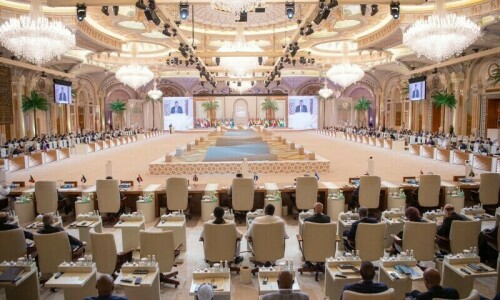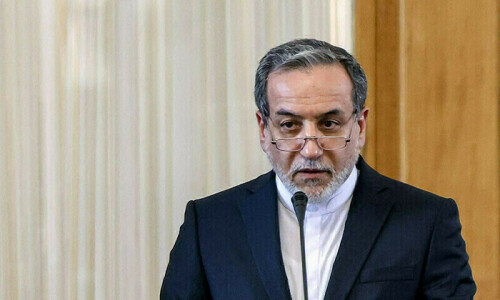AFTER silently watching Israel’s genocidal war in Gaza for the past one year, the leaders of the Arab and Muslim countries have once more met in Riyadh to discuss the escalating conflict.
The so-called international alliance conceived by Saudi Arabia, with its aim of pressing for the establishment of a Palestinian state, failed to formulate a concrete plan of action to stop the Israeli invasion that has been extended to Lebanon.
Interestingly, the resolution issued at the conclusion of the joint summit of the Organisation of Islamic Cooperation and Arab League is restricted to the usual condemnation of Israeli aggression. It doesn’t even plainly describe the ongoing Israeli military action in Gaza, which has killed more than 43,000 people, mostly women and children, as a genocide.
There is no suggestion to sever the diplomatic and trade ties with Israel that some of these countries continue to have, despite the war crimes being committed by the Zionist forces. With the complete blockade of the Gaza Strip, more than a million people face death by starvation and disease. Mere condemnation cannot stop Israel’s genocidal war. It is nothing short of a betrayal of the hapless people of Palestine.
In fact, the inaction of the Muslim world has given impunity to the Zionist state, which is now threatening to annihilate the entire occupied territory. The latest summit was held a year after a similar gathering in Riyadh. Then, too, the leaders had merely condemned the Israeli military action in Gaza. They could not agree on even a minimum plan of action to stop Israeli atrocities.
The OIC-Arab League resolution does not go beyond the usual condemnation of Israel.
They did not even leverage their oil and economic capabilities to apply pressure on countries supplying arms to Israel to stop the war. One year of war crimes doesn’t seem to have brought any change in their position, which can be described as capitulation. The resolution is as toothless as the previous one.
The most shocking part of the resolution is the decision “to affirm support and express appreciation for the tireless efforts made by the Arab Republic of Egypt and the State of Qatar in cooperation with the United States of America to achieve an immediate and permanent ceasefire in the Gaza Strip… “. It couldn’t get more outrageous given that the ongoing genocide in Gaza is essentially supported by the US. It is massive American military aid that has helped Israel sustain its war.
Notwithstanding the occasional rebuke by US officials, there has never been any real American pressure on Israel to implement a ceasefire. In fact, the Biden administration has repeatedly vetoed resolutions in the UN calling for one. Some of the Arab rulers are believed to have tacitly supported what Israel has described as its war against Hamas. Moreover, America has its bases in Arab countries, and concerns have been raised that they could have supplied Israel with weapons to kill Palestinians. These countries have not prohibited the use of these bases.
Significantly, the latest summit took place soon after Donald Trump’s victory, which has been hailed by some member countries, prompting observers to conclude that it was meant to send a message to the incoming US administration. It seems that the ‘international alliance’ is now pinning its hopes on the incoming Trump administration to get Israel to agree to a ceasefire and accept the creation of a Palestinian state.
For instance, while addressing a Council of Foreign Ministers preparatory meeting a day before the summit, Pakistan’s Foreign Minister Ishaq Dar expressed the hope that the incoming US administration would “lend its weight to reinvigorate efforts for peace in the Middle East”. His remarks show his utter ignorance about Trump’s hard-line approach to the Middle East conflict.
Such expectations from the president-elect, who is considered even more pro-Israel than the outgoing Biden administration, are unrealistic. During his election campaign, Trump had called on Israel to finish the offensive and “get the job done”. He has stated that he would “defend our friend and ally in the State of Israel like nobody has ever”.
How can one forget that in his previous term he shifted the American embassy to occupied Jerusalem? The move defied Washington’s earlier position of not recognising one of the most sacred of Islam’s holy places as Israel’s capital. In his previous term, Trump had also endorsed Israeli settlements in occupied West Bank, which are illegal under international law. Under the so-called Abraham Accords, he oversaw the establishment of diplomatic relations between Israel, the UAE, Bahrain, and Morocco.
Although Saudi Arabia did not enter into such an agreement, it did indicate its willingness to recognise Israel in return for security and economic benefits, though insisting there would be no diplomatic ties without a Palestinian state. Some analysts believe that the Riyadh summit has sent a clear signal to the incoming Trump administration that it can rely on the kingdom as a strong partner in extending American interests in the region. The summit has pushed for greater American leverage in bringing the war to an end.
But it is very clear that the incoming Trump administration will not push for the establishment of a Palestinian state as envisaged by the ‘international alliance’. There has been no mention of the two-state solution in his recent statements on the Middle East conflict.
Since winning the election, Trump has spoken to the Israeli prime minister more than once. Therefore, it’s not surprising to see the right-wing Israeli government harden its position after Trump’s election.
In a recent statement, Israeli Foreign Minister Gideon Sa’ar opposed the establishment of a Palestinian state, saying it was “unrealistic”. Surely the inaction of the Arab and Muslim countries has made things worse for the Palestinians. The joint resolution indicates that these countries do not have any intention of using their leverage to put pressure on Israel and its allies to end the war.
The writer is an author and journalist.
X: @hidhussain
Published in Dawn, November 13th, 2024
















































